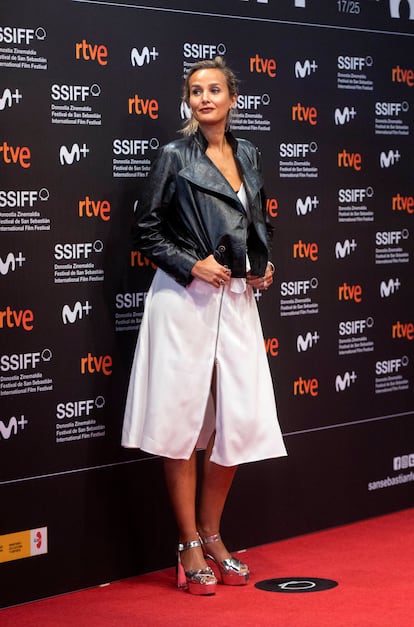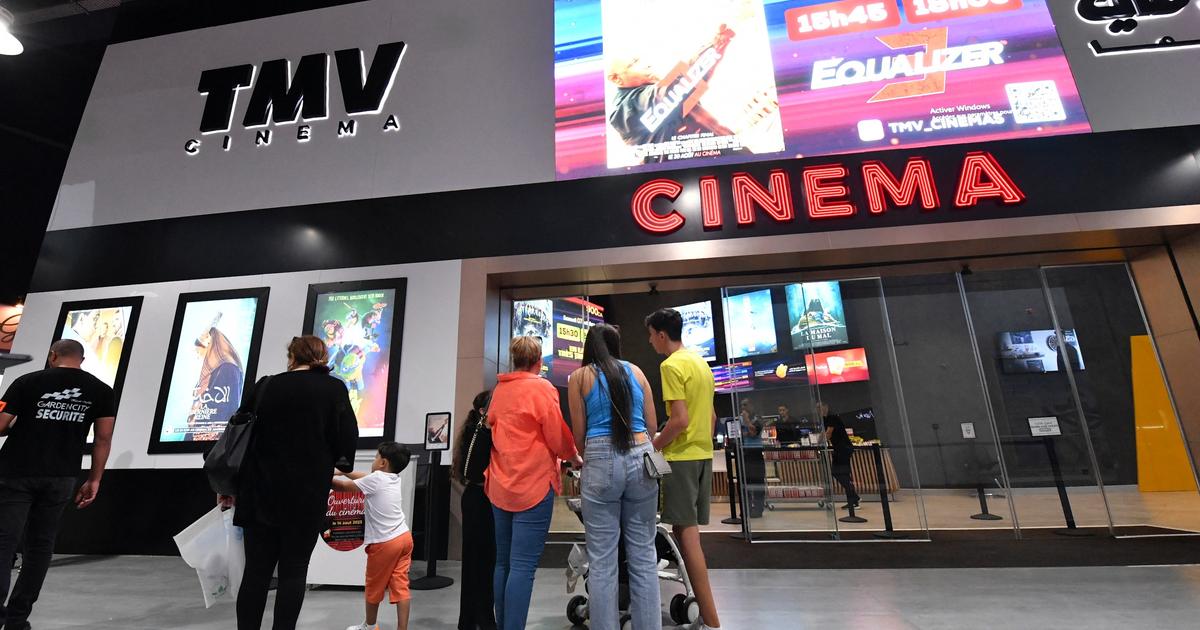In the last three years an earthquake has shaken the world of cinema. The fault: a combination of various factors that have affected various sectors of the industry. A new generation of creators that is replacing the classic names of European auteur cinema have finally been joined by the appearance of a whole group of women filmmakers, the search for different forms of expression determined to make films that are only understandable in one hall, and - in a matter of awards - the entrance of very numerous foreign voters into the Hollywood Academy. The result: the last two Oscars have featured films built from the margins of the industry, such as
Parasites,
by Korean Bong Joon-ho (who had just won the Palme d'Or at Cannes 2019), and
Nomadland,
by Chloé Zhao (who had won at Venice 2020).
At the San Sebastian festival, which closed this Saturday, the winners of the last four major competitions have coincided: the Georgian Dea Kulumbegashvili
(Beginning,
Zinemaldia 2020), the Romanian Radu Jude
(Bad Luck Banging or Loony Porn,
Berlinale 2021) , and the French Julia Ducournau
(Titane,
Cannes 2021) and Audrey Diwan
(The event,
Venice 2021).
More information
What is a film festival for?
Split screen: the visual metaphor of the pandemic
EL PAÍS has asked them and other important creators about the future of cinema as an art form and if they feel part of this new movement.
We are not talking about platforms, lockers or budgets, but about that experience that removes the public, from the soul of the works.
And in a time when museums such as the MoMA in New York, the Pompidou Center in Paris or the Reina Sofía in Madrid host audiovisual works both experimental and documentary or of a more classical nature and bet on the cinema in their activities, the interviewees haggle that possibility : the majority emphasize that the final objective is the public and that the cinema was born as popular art.
"We can never forget that," insists French Céline Sciamma.
Dea Kulumbegashvili, at the presentation of the official jury of the San Sebastián festival Alberto Ortega / Europa Press
When last year Dea Kulumbegashvili (Oriol, Russia, 35 years old) won four awards, including the Golden Shell, with her
Beginning,
it was clear that there was a powerful filmmaker there. Her voice has been heard in the record of the 69th edition of the San Sebastian festival, because the Georgian presided over the jury of the official section. For her, "the future is to press the form." And for this reason, he raises a question: "We have to ask ourselves if the narrative simply has to happen or if it is the result of an atmosphere, of the game with form and time." And, indeed, he feels that cinema is riding a wave of change. “Interestingly, of these four winners of the great class A festivals, three are women and their juries have not evaluated the gender. I think we need even more female directors to normalize this process ”. In the jury that she presided over, and that effectively awarded a Golden Shell to a creator - the Romanian
Crai Nou
(Blue Moon), by newcomer director Alina Grigore— there was also the French Audrey Diwan (Paris, 41 years old), who two weeks ago won the Venetian Golden Lion awarded by another special jury: it was chaired by the South Korean Bong and in it was Zhao. “When the award ceremony was over, Zhao explained to me that they had valued the films without seeing who was directing them, and only later did they realize that it was a woman,” says Diwan. "If we talk about filmmakers, Kathryn Bigelow paved the way for a woman to direct any genre, that we did not stay in 'feminine themes'. As for the future of cinema as an art, it is clear that it involves the education of children so that they appreciate that art and understand it. Do you know what I tell my children before I put a movie at home? What is a 'banned movie'. And I hook them.I know from his reaction that I don't have to worry about the future of cinema. "
Julia Ducournau director of 'Titane', in San Sebastián 'Alberto Ortega / Europa Press
Julia Ducournau (Paris, 37 years old) caused an earthquake two months ago in Cannes by winning the first solo Palme d'Or for a filmmaker, and also achieving it with a radical film in its narrative - although classic in its forms - as
Titane,
that thrashed the spectators. "Sometimes I do feel that there is a change," concedes Ducournau. “Of course, that's how I lived it on the Cannes stage with La Palma in hand. What was happening was bigger than my film, than myself ... Suddenly, I looked into a future open to everyone ”. On art, he explains: “I see films that reactivate my confidence in cinema as art. And it can only be obtained from creative freedom. Like in literature, painting ... sometimes you feel it. And when it comes to festival winners, it is clear that there is no going back. There is pressure for something as logical and obvious as parity. Being part of this excites me ”.
When the Romanian Radu Jude (Bucharest, 44 years old) hears the question about the future of cinema, he gets up, sits next to the journalist and takes out his mobile to open TikTok. "This is what cannot be, we cannot believe that all audiovisual is cinema or that cinema resembles audiovisual," he says. “Let's forget about Hollywood, or those bets for other formats: from IMAX we went to three dimensions, now they talk about virtual reality. I believe that reflection will save us as art, that the epistemological side of cinema will be the basis of that future. Because if you think about the rendering side, you already have TikTok: what you see is what you get. You don't need the cinema to see the world, an application on your mobile is enough ", he comments while videos and melodies are linked on the screen of his phone.
French director Céline Sciamma, at the March presentation of 'Petit Maman' Claire Mathon
With her fascinating filmography, Céline Sciamma (Pontoise, 40 years old) has become the reference European filmmaker with enormous influence on generations of young female filmmakers. Your voice is respected. “I cannot separate the future of cinema from political-social changes. Here it is true that we have the wind in our favor. And the festivals' support for riskier cinema is good news. But it is important to lean on strong ideas. If not, we will not be able to resist, to move forward ”, reflects the director of
Petit maman
(2021). "That is the way. From another, flabby films will come out. And for me a movie is seen in theaters. I'm not worried about the future of cinema as an art form, I'm worried that what will triumph is that flaccidity ”.
Carlos Saura (Huesca, 89 years old) accumulates an enormous filmography that has marked the second half of the 20th century in Spanish cinema. In recent times, beyond his musical films, he has made some shorts with photosaurs, which is what he calls the photographs taken by him, which he later turns into drawings to be the basis of those films. Every day he watches a couple of movies, and for this reason he explains: “I don't know where the cinema will go, nor do I think much about it. As a spectator, I go to bed very late, almost at three in the morning, and I watch everything: from good movies to bad ones, and that's how I learn what I don't want to do ”. And what do you want to do? “I don't know, what I have clear is what I don't want to do. That same reflection is worth to me about the future of cinema as art. I don't know where it will go, but it will surely go ”.
Carlos Saura, at the inauguration of San Sebastián Daniel Gonzalez / GTRES
The French-Argentine Gaspar Noé (Buenos Aires, 57 years old) has been revolutionizing the Cannes festival for some time with his films.
In his last two films,
Lux Aeterna
(2019) and
Vortex
(2021), has opted for the split screen. "One thing is the cinema, another is television and now they are mixed," he says. “If in a decade the big distributors are Amazon or Apple, the films will come out first on platforms and then in theaters, and then maybe the show in cinemas will be a bourgeois thing. Popular consumption will take place at home. I don't care about that as a filmmaker. What does seem like a sensitive issue to me is financing. Whatever we do, art or fun, if the money comes from those conglomerates, close to conservative groups, we will suffer censorship, the risk will disappear. Look at how eroticism has disappeared in the last two years. It is the advent of a frigid era ”. On the other hand, the Mexican Alonso Ruizpalacios (Mexico City, 43 years old) is frightened by “the excess of audiovisual information”.The filmmaker, coming from the theater, has delved into creation and risk until reaching
A cop movie
(2021), award for artistic contribution at the Berlinale, which used
off
the voice of two real cops to tell their daily lives as they embody two separate screen actors.
“The insatiable search for content makes me sad.
Really, does the world need another movie or another series?
Cinema as art must answer that question, that and the obligation we have as artists to offer enjoyment, to immerse the public in dreams and the unconscious.
Where we go?
I don't know, but surely it will be to a field where Jean-Luc Godard will have already been ”.
The French-Argentine director Gaspar Noé, this week in the contest.Javier Etxezarreta / EFE
When the Hollywood Academy film museum in Los Angeles finally opens next Thursday, in one of its windows you will see the iPhone with which Sean Baker (New York, 49 years old) shot
Tangerine
(2015) in its
entirety
. With
The Florida Project
(2017) he confirmed himself as one of the great voices of
American
indie
cinema
, and the screening of
Red Rocket
at the last Cannes
divided the public.
"They are pushing us towards museums, and I don't know ...", he laughs.
“It's strange because as an author I do feel that I am growing as an artist.
For me, the future is about talking about human beings, not about superhero franchises.
If you analyze the creators of the seventies, there you find the same doubts, which they passionately overcome.
As long as someone celebrates good cinema, there will be good cinema ”.















/cloudfront-eu-central-1.images.arcpublishing.com/prisa/IGZ7GOCXZ5GUPAQ2HWGK6Z76BU.jpg)